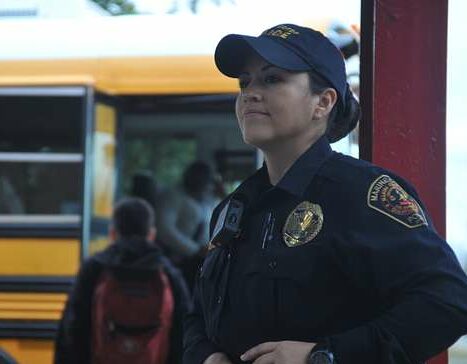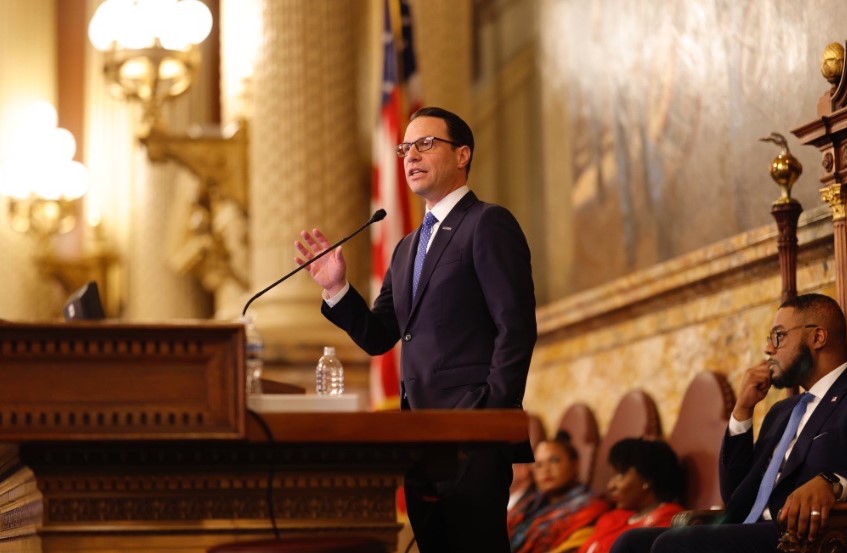PA Senate Bill Would Require Armed Officers at Schools

On Aug. 25, a 17-year-old student came to the Cheltenham/Abington football game with a gun tucked into his waistband. That same evening, a teenager was gunned down at a football game in Choctaw, Okla.
State Sen. Mike Regan introduced a ripped-from-the-headlines bill on Tuesday to address fears inspired by stories like these. Senate Bill 907 would require school districts to employ an armed, trained, and vetted security person at every school during school hours.
“Students want to know their schools are safe, and parents want to know their children will come home at the end of the school day. The safety of students, teachers, and school staff should be a top priority. Students deserve a safe environment where they can learn and grow, and teachers should not have the sole responsibility for protecting our kids,” said Regan (R-Cumberland/York).
Abington Police Chief Patrick Molloy said the quick thinking and skill of two of his school resource officers allowed the gun-carrying Cheltenham student to be arrested without incident and before anyone got hurt.
“Thank God for a mother who wanted to remain anonymous, saw the gun in the kid’s waistband,” he said.
He said the youth at the Abington field allegedly had a ghost gun with 30 rounds and two extended magazines with a laser affixed for accuracy.
“God knows what he was up to. But the actions and the planning of those two officers to take him into custody, with very few people even knowing it and escorting him out of there, was remarkable,” said Molloy.
School resource officers have extra training and “want to be with the kids,” he said.
“It takes a special kind of cop that wants to do that,” said Molloy. “I think that’s how we should be recruiting. We should do everything we can. My officers are highly trained. One of them is a SWAT officer. He’s in the school all day. They have all kinds of tools on their belt, but the biggest tool is their ability to communicate and de-escalate.”
“In 30 years, we’ve had school resource officers in Abington Township, and we’ve had no major uses of force,” he added.
Regan’s legislation also aims to enhance safety at school extracurricular activities. It would allow school boards to station armed school security personnel on school grounds during extracurricular events outside regular school hours.
Part of the bill would require any armed school safety personnel to comply with vigorous training and certification requirements, including lethal weapons training and student interaction training.
Sen. Tracy Pennycuick, who represents parts of Montgomery County, applauded the initiative.
“It is unacceptable that our nation’s schools, teachers, and students have become targets for those seeking to perpetrate violence,” Pennycuick said. “Having professionally trained school safety personnel on campus is a commonsense step we can take to better secure our institutions and ensure that there is an extra layer of security keeping our kids safe. Our children are our most cherished treasures, and I applaud my colleague, Sen. Regan, for advancing this important proposal.”
Sen. Jarrett Coleman (R-Bucks/Lehigh) supports efforts to improve and increase school safety but also has not had a chance to read the bill and can’t comment specifically, a spokesman said
But some senators have reservations.
During a podcast interview with DVJournal, Sen. Anthony Hardy Williams (D-Delaware/Philadelphia) said that while he hadn’t seen the bill, he did have some concerns about the concept.
“I don’t know the bill,” said Williams. “I don’t know the limitations or parameters. I don’t know who gets to be armed, or how much training they have. Many of the police officers who do school policing are not necessarily candidates that have graduated from the law enforcement schools.”
He pointed to the death of 8-year-old Fanta Bility who was hit by gunfire from three now-former Sharon Hill officers. They reacted to shots fired by two teenagers who were fighting down the block and fired into people leaving a game.
“Unfortunately, I have to say this, you know, we had police officers that were not trained at a sporting event that led to significant tragedy and the death of a child in Delaware County,” said Williams. “So just having someone there without proper training does not guarantee anyone’s safety.”
Regan argues the state must step up.
“We require our children to attend school; therefore, it is incumbent upon us to do everything we can to secure them while they are there,” Regan said. “Failure to enact this bill would leave our schools, teachers, and students more vulnerable to attack. That is too great a risk that we just cannot take.”
Since 2018, the General Assembly has appropriated $800 million in grant funds to help districts pay for school safety and security upgrades. According to the Pennsylvania Department of Education, about half of the commonwealth’s 500 school districts have taken advantage of that funding to put armed officers in schools.
“Many school districts haven’t done what is considered by school security experts as the most effective method of deterring acts of violence, and that is putting an armed, trained, and vetted officer in every building. The time to fix that is now, before another school falls victim to a heinous act of violence,” Regan said.



